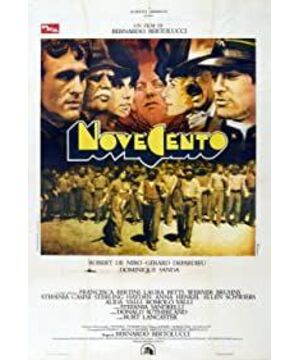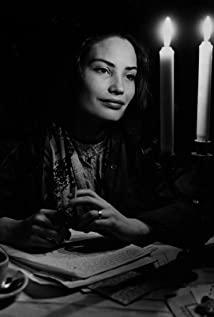At the beginning of the 20th century, in an ancient manor in central Italy, two children were born at the same time one day, Alfred, the grandson of the domineering manor owner, and Olmo, the grandson of the old tenant. The old manor owner was very happy, and he distributed the good wine for many years to the tenant farmers to celebrate the birth of his grandson. But the old tenant Nun Leo, who also had his grandson, was not happy: one more child means another mouth to eat. Regardless of their identities, the two children grew up together in constant bickering and bouts. The owner of the old manor committed suicide in the cowshed, and the property was stolen by Giovanni, the father of his second son, Alfred, who was indifferent and greedy. Alfred hates this selfish and indifferent family, and worships his uncle, David Waw, who runs away from home and travels the world. Soon, the mercenary Giovanni purchased a harvester to drive away the redundant tenant farmers. The farmers resisted spontaneously, but they were no match for the intervention of the army. The farmers had to harvest the grain by themselves. Old Leo closed his eyes in relief when he saw this scene. On the eve of the First World War, Italian society was facing changes, and Olmao left his hometown and went to the city.
After the war, Olmer returned from the army and met Alfred again as a captain. At the same time, she fell in love at first sight with Emily, a primary school teacher with socialist thoughts. Alfred met Ada, a French girl with modern thinking, at his uncle's house, and fell in love with her. After the war, the gap between the rich and the poor in Italian society was serious, and the revolution of workers and peasants was imminent. Giovanni hires Aguilar, a ruthless, cunning and fickle veteran as the farm supervisor. Once again, the farmers are in danger of leaving the land and wandering around. They are organized by Olmau Emily to resist the exploitation of the estate owners. , was once again suppressed by the army. The awakening of the revolutionary consciousness of the workers and peasants caused panic among the landlords, who supported the rising fascist organizations to suppress the workers' and peasants' revolution. Alfred stayed out of the matter, still having a romantic relationship with Ada, inheriting the estate after Giovanni's death. But the indecisive Alfred could neither realize the reform of the manor advocated by Olmau, nor get rid of the expansion of the increasingly rampant Akira's fascist forces in the manor. Amy died in childbirth, leaving Olmau with a daughter, and Ada gradually became disappointed with Alfred, but loved Olmau's daughter sincerely. Parasitic in the manor since childhood, Lakina and Akira, who were ambitious to inherit the manor, made a peace. Akira became the party secretary of the fascist province through bloody suppression of the peasants and the robbery of the middle class, while Alfred increasingly became a their puppet. With the end of the war, Akira's exploitation of the peasants became increasingly frenzied, Olmao was forced to run away, and Ada eventually ran away from home, leaving Alfred alone and living as a walking dead.
The war was over, the peasants revolutionized again, and Akira was executed. The peasants who got the weapons thought that they had finally turned themselves into masters. They consciously divided the manor, and everyone had their own land. Olmer, who became the leader of the Communist Party, returned to his hometown and rescued Alfred, the former landlord, in a congress against the public trial. While the peasants celebrated the half-century of struggle, the newly formed government sent in the police to collect the weapons, and the revolution failed in the end. But the fire of revolution does continue to be passed on.
Decades have passed, and the old friends, Olmund and Alfred, have turned into gray-haired old men, but they are still quarreling as they have been for most of their lives.
Different from the usual methods of class themes in China, which are bitter and bitter, Lao Bei uses the half-century friendship of two men from different class backgrounds as a perspective to outline the magnificent Italian society from the beginning of the twentieth century to the end of World War II. Epic picture. Lao Bei has always been good at depicting the fate of little people in the context of big history. The characters in his films are like the Greek heroes of Homer's epics, and they are ultimately tragic and are more like puppets of history. Just like Puyi under Japanese control among the last emperors, Marcello among the drifters, and Paul, disheartened by the revolution, among the last tango in Paris. They are all spiritual aristocrats who pursue aesthetics. They are of noble birth but cannot hide their cowardice and cowardice towards real life. Although they also have an instinctive disgust for the ugly reality, they would rather keep themselves out of the way and hide in the illusion of drunkenness or delicacy. The evil forces condoned and even helped Zhou to do evil. In the end, they can only live alone in the world like walking dead. Bertolucci just announced the complete demise of such an aristocratic intellectual class, and was replaced by a new generation who truly represented the thinking of the working class.
Alfred was born in such a declining aristocratic family. The film starts from his memory. The day he was born was the same day that Verdi died. His grandfather, the domineering old manor old Alfred De appeared to be more anxious than anyone else, and he even let his daughter-in-law in labor be proud of the family, 'Don't let the tenant's child take over the head' (Olmau was also born on the same day). His childhood was not perfect. Like other children, he rebelled against his father's authority at the dinner table. Unfortunately, he was not Cosimo and did not uphold his ideals. But two people had a huge influence on his childhood: his grandfather Alfred Sr. and his great-uncle Walter Otavi. His grandfather instilled in him the old-fashioned aristocracy of doing whatever he wanted, and Ottaway made him yearn for a free-spirited aestheticism from an early age. This is incompatible with his well-behaved, greedy and selfish father, Giovanni. When he and Olmau meet after the First World War and go out for fun in the city, the way he treats a poor girl in prostitution reveals a pair of friends who see life differently: Olmau sympathizes with this reluctant betrayal of bodily possessions. The skinny girl who is crazy in Yang Dian; and Alfred thinks it is justified to pay for whoring, and ignores the girl who is crazy in Yang Dian. Then he met Ada, and his admiration for beauty under the influence of Odavi's subtle influence finally had a perfect image.
He conquered Ada according to the brutish and luxurious aristocratic style that his grandfather instilled in him. When he and Ada had sex frantically, several elderly farmers were burned alive by the fascists. Old Bay is revealing the emptiness of his love in that dark age, too, while Alfred and Ada Vodavi are having fun at the inn as Olmau and his love lead the peasants to face military repression. In the swimming pool, Ada, like a noble queen, made Alfred at her feet swear: 'Never be bald and potbellied, always love her'. It's a pity that the same naive Ada can't imagine that even though Alfred is forever young and handsome, the love between the two is still shrouded in tragedy. At the wedding, Alfred knew that Olmer was wronged, but he still did not dare to publicly defend his friend, but covered up the real murderer Akira. Odavi leaves the wedding disappointed with him, and Ada begins to realize Alfred's weakness. But she still has fantasies about him, hoping to change her lover with the help of her old friend Olmo. Even more than Alfred himself, he knew the importance of Olmer's friend. She confided to Olmer her love for Alfred, 'You are now Alfred's only true friend'. Alfred couldn't understand Ada's good intentions, but thought that the two had an affair. When the misunderstanding was cleared up, the two friends started the most peaceful and sincere dialogue in their lives. It's a pity that Alfred was unable to take action against the forces of darkness, even under the watchful eye of his friends and loved ones. With yet another crime by Akira, Ada is completely disappointed in Alfred. When Olmau, the last hope to change Alfred, left, Ada gathered the courage to leave the lifeless manor house under the fascist rule, and also left Alfred who seemed to have no cure.
When Ada left, she left the clothes she and Alfred wore when they first met to the maid, because at this time she knew that Alfred did not like the real her, but his own in his heart. Images, like what most of us pursue our whole lives, are just phantoms.
View more about 1900 reviews











